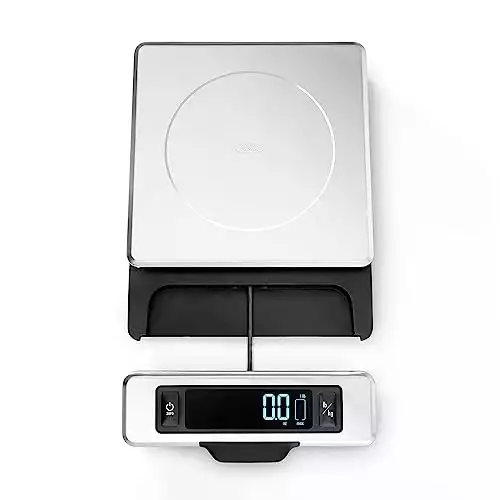Over my years of coaching, I’ve encountered numerous young athletes eager to bulk up without sacrificing their barely visible abs.
It’s a common dilemma: the desire to gain muscle without the added bulk.
Here’s the hard truth I often share, but many hesitate to accept: gaining muscle requires consuming more calories than you burn.
It’s a simple equation of caloric surplus equals muscle gain. If the scale isn’t budging, you’re not fueling enough for muscle growth.
The irony? While many are focused on shedding pounds, gaining weight – specifically lean muscle – is a different ball game. It’s a more complex process than losing fat.
So, how much should you actually eat for muscle hypertrophy without overdoing it? Is it an overwhelming 10,000 calories a day, or something more manageable?
Let’s break it down and find out!
Table Of Contents
- 1 Key Takeaways
- 2 How To Build Muscle Without Getting Fat
- 3 Increasing Calorie Intake To Gain More Muscle
- 4 Isn’t Weight Training More Important?
- 5 Proper Macronutrients For Muscle Growth
- 6 Calculating Macronutrients For Optimal Muscle Building
- 7 What To Eat To Gain Muscle?
- 8 Can You Still Gain Muscle Without Eating Healthy?
- 9 Why Am I Not Gaining Muscle?
- 10 Conclusion
Key Takeaways
| Key Takeaways | Details |
|---|---|
| Caloric Surplus for Muscle Gain | Consume more calories than you burn. Aim for a 5-10% increase in calorie intake and monitor progress. |
| Proper Macronutrient Balance | Aim for 0.8 grams of protein and 0.3 grams of fat per pound of body weight. Allocate remaining calories to carbohydrates. |
| Progressive Overload in Training | Focus on increasing weight or reps over time, ideally in the 4-8 rep range. Avoid excessive volume; 4-8 intense sets are optimal. |
| Importance of Recovery | Ensure full recovery before retraining the same muscle group. Watch for signs like consistent performance improvement and lack of excessive soreness. |
| Monitoring Progress | Track weight gain (0.5-1% of body weight per week) and strength improvements. Adjust diet and training based on these metrics. |
| Balanced Diet for Muscle Growth | Include a variety of foods, balancing healthy options with occasional indulgences. Consistency and balance in diet are key. |
| Consistency is Key | Maintain a consistent approach in both diet and training for sustained muscle growth. |
How To Build Muscle Without Getting Fat
In the world of muscle building, there’s a golden rule: slow and steady wins the race.
Aiming for a weight gain of more than 0.5% of your body weight per week? That’s speeding in the muscle zone.
For a 200 lb individual, gaining 1 lb per week strikes the perfect balance for growth without the unwanted fat.

It’s a common question from gym-goers who haven’t quite nailed their muscle gain phase. The key? Patience and hard work.
Think of it like this: just as you wouldn’t want to lose more than 10% of your body weight when shedding fat, you shouldn’t gain more than 10% during your muscle-building journey.
That’s a 20 lb cap for our 200 lb friend, ensuring muscle gains without tipping the scales too far.
Remember, the leaner you start, the more of your weight gain is likely to be pure muscle. But as body fat increases, growing muscle becomes a tougher challenge.
This isn’t the time to go wild with your diet. Overeating leads to fat gain, not just muscle. I’ve seen it happen too often to ignore.
So, take it from me: when it comes to building muscle, it’s not just about lifting weights, but also about lifting your fork the right way!
Increasing Calorie Intake To Gain More Muscle
Embarking on your muscle-building journey, you’ll start with a calorie surplus. But here’s the catch: there will come a time when your gains plateau.
That’s your cue to up your calorie game. A modest increase, say 5-10%, should do the trick.
This isn’t about going overboard; it’s about fine-tuning your intake to keep the gains coming. Stay vigilant with your weight and keep pushing your limits in the gym.
Now, let’s talk about a crucial ingredient in the recipe for muscle growth: consistency. Building muscle is a marathon, not a sprint.
It requires a gradual increase in your food intake over time. Skipping this step is like trying to drive a car without fuel – you simply won’t get far.
I’ve seen many athletes, especially the leaner ones, who just wing it with their diet and end up stuck in the same spot.
The solution? Embrace the food scale and a tracking app like MyFitnessPal. It’s about being precise and consistent with what you eat.
So for this, I recommend a food scale similar to this one. I’m a massive fan of this food scale because it has a pull-out display.
Most scales are small in diameter, and you can’t even read what it says because it’s blocked while weighing food out.
Introducing the Good Grips 11 Pound Stainless Steel Food Scale - smudge-resistant, easy-to-read digital screen, removable platform for easy cleaning, and unit conversion button. Simplify your cooking today!
Isn’t Weight Training More Important?
There’s a common misconception that just hitting the gym hard is enough to build lean muscle. But that’s only half the story.
Without a calorie surplus, all those workouts might not translate into more muscle. It’s like expecting a house to build itself without bricks and mortar.

Many believe they’re eating enough, yet struggle to gain weight. The problem? “Enough” is often not quantifiable or consistent.
Muscle building is a precise science – it’s not just about lifting weights, but also about meticulously tracking your calorie intake and body weight.
In essence, to build muscle, you need to fuel your body more. It’s a straightforward yet often overlooked principle.
Eat more, track your progress, and then watch as your efforts in the gym pay off.
Proper Macronutrients For Muscle Growth
When it comes to optimizing your diet for maximum growth, it’s not just about the calories. The right balance of protein, carbs, and fats is key. Let’s simplify the numbers:
- Aim for 0.8 grams of protein per pound of body weight. Higher calorie and carb intake help preserve muscle, allowing for a bit less protein and more room for carbs and fats.
- Target 0.3 grams of fat per pound of body weight. This is crucial for maintaining hormone levels and shouldn’t drop below 30% of your total body weight.
- Allocate the rest of your calories to carbohydrates. Carbs are vital for muscle gain and maintaining energy levels – the more, the merrier.
For a 200 lb athlete, this means a balanced intake of proteins, fats, and carbs, tailored to support growth without excess.
Now that we have these guidelines out of the way let’s calculate the proper macros for our sample athlete.
Calculating Macronutrients For Optimal Muscle Building
Fueling up for muscle growth involves a balanced mix of carbohydrates, vegetables, proteins, and fruits.
Let’s break down the macronutrient plan for our 200 lb athlete starting with a 3,000 calorie diet:
- Protein needs: 200 lbs x 0.8 = 160 grams (equivalent to 640 calories, as each gram of protein has 4 calories).
- Fat requirements: 200 lbs x 0.3 = 60 grams (equaling 540 calories, with each gram of fat providing 9 calories).
Subtracting the calories from protein and fat from the total gives us:
- 3,000 total calories – (640 from protein + 540 from fat) = 1,820 calories remaining for carbohydrates.
Dividing the remaining calories by 4 (as each gram of carbohydrate has 4 calories) gives us:
- 1,820 / 4 = 455 grams of carbohydrates.
So, our athlete’s starting diet plan is:
- 3,000 calories consisting of 160 grams of protein, 60 grams of fat, and 455 grams of carbohydrates.
Remember, this is a flexible plan. If you prefer more fats to carbs, adjust accordingly. The key is to maintain protein levels while adjusting carbs and fats to meet your calorie needs.
What To Eat To Gain Muscle?
Goku is one of the biggest and strongest characters in the entire multiverse. He trains hard, fights hard, and eats enough to fuel his heavy workload. If you need it, sometimes calorie-dense foods are necessary to get it done.
Some struggle to gain weight, often due to inconsistency and not tracking their calorie intake and body weight.
If you’re one of those with a fast metabolism finding it hard to consume enough calories, here’s a straightforward solution: integrate calorie-dense, micronutrient-rich foods into your diet.
While no specific food guarantees muscle gain, certain choices can help you meet your calorie goals more easily:
- Peanut butter and honey sandwiches
- Protein shakes with whole fat milk
- Gatorade during workouts
- Post-workout cereal
- Pancakes
- Dried fruits like raisins, dates, and prunes
- Healthy fats and oils, such as olive and avocado oil
- Nuts: almonds, cashews, peanuts, macadamia nuts
- High-fat dairy products: milk, yogurt, cheese
- Eggs, white rice, and ground beef
- Occasionally, even “junk food” can be beneficial
These options can significantly boost your calorie intake without making you feel overly full.
For those who find it challenging to consume enough through regular meals, adding these energy-dense foods can be a game-changer.
Remember, the goal isn’t to eat in a calorie surplus indefinitely. It’s about finding a balance.
Eat healthily most of the time, train effectively, and when necessary, include less healthy options to meet your calorie needs.
Can You Still Gain Muscle Without Eating Healthy?
You can eat like Kevin McCallister occasionally and still build muscle. Seriously I promise.
Many believe that simply eating healthy is the key to gaining muscle and staying lean, but it’s not that straightforward.
To build bigger muscles requires a calorie surplus and rigorous training. While healthy eating is beneficial, it’s not the sole factor in muscle hypertrophy.
To effectively build lean muscle, focus on these three essentials:
- Calorie Surplus – Essential for building muscle mass. Your body needs more calories than it burns to rebuild and grow muscle tissue.
- Protein Intake – Aim for at least 0.8 grams per pound of body weight. Protein is crucial for muscle repair and growth. Insufficient protein leads to more fat gain relative to muscle.
- Intense Training – Without challenging workouts, increased calorie and protein intake might just result in fat gain rather than muscle.
Healthy eating contributes to overall progress, but it’s not mandatory. If you’re prone to gaining fat, prioritize healthier food sources.
Remember, a healthy diet can include a variety of foods – lean proteins, fruits, vegetables, and even occasional indulgences.
The key is balance: eat healthily most of the time, train hard, and allow room for flexibility in your diet.
Why Am I Not Gaining Muscle?
Struggling to gain muscle is a common concern I hear about often.
If you’re puzzled about why you’re not seeing the gains you want, it’s time to take a closer look at your muscle-building strategy.
To unlock the secret to effective muscle growth, consider the broader aspects of your diet and training plan.
It’s not just about how hard you’re training, but also about the balance of your workout volume, recovery periods, nutritional intake, and overall strength progression.
Each of these elements plays a crucial role in your muscle-building journey.
Let’s delve into these areas to identify what might be holding you back and how you can fine-tune your approach for better results.
By addressing these key factors, you can reignite your progress and start seeing the gains you’ve been working towards.
Are you training hard enough?
Gaining more muscle requires more than just frequent training; it demands progressive overload and training with high intensity, especially for those beyond the beginner stage.
Building muscle isn’t about the sheer volume of exercises but about increasing strength within the 4-8 rep range.
The key is simple yet challenging: consistently add more weight or reps to your exercises. Each session should be a step up from the last, pushing your muscles to adapt and grow.
If your muscle gains aren’t meeting your expectations, it’s time to evaluate and possibly ramp up your training intensity to ensure it’s sufficient.
Do your workouts have excess training volume?
While high-volume training is popular among many coaches, it’s important to recognize that it doesn’t necessarily equate to progressive overload.
You either need to increase the weight or the number of reps, not just add more sets.
Simply resting longer to perform more sets doesn’t stimulate the same growth as progressively lifting heavier or increasing reps.
For example, moving from a challenging 4-rep set at 200 lbs to an 8-rep set over a few weeks is a clear sign of muscle development.
High-volume routines, often involving 10-20 sets per body part each week, can lead to overtraining and hinder recovery.
In contrast, 4-8 intense sets taken close to failure can be more effective and less taxing on recovery.
This approach allows for more efficient muscle building and recovery, rather than continuously increasing workout volume.
Consider trying a lower volume, higher intensity program and see how it aligns with your muscle-building goals.
Are you recovering?
Recovery is a key indicator of effective training. You know you’re on the right track if you’re fully recovered before your next session targeting the same muscle group.
Signs of good recovery include consistent performance improvements and not feeling excessively fatigued or sore.
On the flip side, if you’re constantly sore, experiencing joint pain, or feeling weak, it’s a sign you might be overtraining, not consuming enough calories or protein, or lacking quality sleep.
Remember, adequate recovery is essential. Without it, your progress will stall.
How many calories are you eating?
As emphasized throughout this post, adequate calorie intake is crucial for muscle building.
Think of it like constructing a house – without the necessary materials, no progress can be made. Hard training alone isn’t sufficient; proper nutrition is the foundation.
Simply put, if you’re not consuming enough calories, muscle growth won’t happen. Supplements and workouts alone won’t cut it.
Aim to increase your calorie intake by 10-20% and track your weight and workout performance for two weeks.
If there’s no noticeable gain in weight or improvement in your exercises, it’s a sign to further increase your calorie intake by another 10-20%.
Stay consistent and keep monitoring your progress.
Are you gaining weight on the scale?
Monitoring your weight gain is essential in assessing your muscle-building progress. Ideally, you should be seeing a noticeable increase over time.
For instance, if you start the month at 200 lbs and only reach 201 lbs by the end, it’s a sign to up your calorie intake slightly.
Aiming for a weekly weight gain of 0.5-1% of your body weight is a good target. For a 200 lb individual, this means gaining 1-2 lbs per week.
Also, don’t forget about protein. Your intake should be at least 0.8 grams per pound of body weight.
So, for a 200 lb person, that’s 160 grams of protein.
If you’re not meeting these protein goals, it’s time to increase your intake.
Are you stronger now than when you started?
Besides calories and protein, increasing your strength is super important. If you’re not progressively lifting heavier or doing more reps, your muscles won’t grow.
This is why some people stagnate, lifting the same weights year after year without visible changes.
To unlock your full muscular potential, focus on getting stronger in the 4-8 rep range. This, combined with proper nutrition, is the formula for growth.
Simply put: get stronger, eat adequately, and watch your muscles grow. Repeat this cycle consistently for ongoing progress.
Conclusion
Simply increasing your workouts won’t guarantee muscle gain. In fact, without a corresponding increase in calories, you might even lose weight.
To effectively increase muscle mass, remember these three key steps:
- Boost your calorie intake by 5-10% for weight gain.
- Focus on strength training in the 4-8 rep range.
- Maintain consistency in your diet and workout routine.
Balance is crucial: too much food leads to fat gain, while training hard without enough calories can stall your progress. It’s all about finding the right mix of diet and exercise.
Have you tried these methods for muscle gain? Share your experiences in the comments!
Until next time,
-Dante
